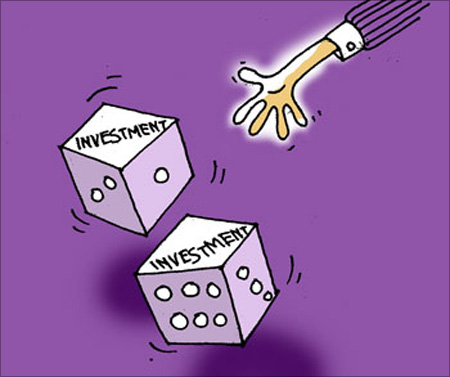 | « Back to article | Print this article |
The biggest financial scams of pyramid schemes
All discussions on retail investment products are focused on insurance, various mutual schemes, stocks and fixed income products. How naive.
Well, the big (untold) story of retail financial products is somewhere else, not in these regulated products. It is the widespread menace of chain-money schemes, or multi-level marketing (MLM) or pyramid schemes.
As we know, the game is to enroll more and more members who would send money up the chain to a few privileged ones at the top. After a while, the whole thing becomes unsustainable because too many people are already in the scheme and it becomes difficult to enroll new victims.
The writer is the editor of moneylife.in.
Click NEXT to read more...
The biggest financial scams of pyramid schemes
At that stage, the fraudsters simply abandon the pyramid and disappear with the money. Women, particularly homemakers, are easy targets because of the promise of quick returns and independent income. The amount of money lost in such schemes is humungous. Here are some major ones:
City Limouzine, a Mumbai-based Ponzi scheme, folded three years later. It had collected a whopping Rs 6,000 crore (Rs 60 billion) from gullible investors.
Those who were entrapped by its promise of high returns included policemen, officers of the income tax department and the Reserve Bank of India.
Click NEXT to read more...
The biggest financial scams of pyramid schemes
Stock Guru India is supposed to have collected Rs 1,000 crore (Rs 10 billion) from investors, after promising them extraordinary returns.
Speak Asia, which asked participants to pay money to fill some silly surveys, apparently collected some Rs 1,300 crore (Rs 13 billion) and went belly up.
A few years ago, Gold Quest was a rage, selling "numismatic coins" for Rs 30,000. It was shut down, but has reappeared as Quest Net and then as QNet. If it goes bust, it will possibly take down thousands of crores with it.
Click NEXT to read more...
The biggest financial scams of pyramid schemes
Several years ago, Japan Life sold magnetic mattresses for a whopping Rs 1 lakh each. At its peak in 2002, it was a Rs 400-crore business, up from just Rs 40 lakh five years before.
A few big scams here and there cannot be extrapolated, you could say. But what if I quote the Andhra Pradesh police, which in a note to the state government has said that there are 2,000 pyramid schemes operating in Hyderabad alone, and over 10,000 in the entire state?
In the eyes of global experts, India has become the most fertile ground for such schemes. The one man who has made his mission to eradicate the menace of these schemes is a deputy inspector general of police in Hyderabad, V C Sajjanar.
Click NEXT to read more...
The biggest financial scams of pyramid schemes
Though he does not get much support, we need a few hundred upright officers like him across India to be able to deal with continuous loot at such a massive scale.
Four decades ago, these were simply chain-money schemes. Money was collected with the promise of giving back extraordinary returns.
Now they come under the garb of selling you some expensive products or some vague services: gold coins (Gold Quest), lifestyle products (QNet), surveys (Speak Asia), and so on. So, at any time, they have the fig leaf of providing some "value".
Even Amway, Oriflame and Tupperware rely on a model with recruitment and ever-expanding chain. For those at the end of the chain to get some crumbs and to sustain the whole chain, products have to be hugely expensive.
Click NEXT to read more...
The biggest financial scams of pyramid schemes
Even then, most people make no money. New recruits are shown a dream - what people in the second link of the chain have achieved. But they are not told that no one beyond the top two or three layers really makes any money.
Dozens of countries consider pyramid schemes frauds and have banned them. These include Canada, the US, the UK, Mexico, most of the European Union, South Africa, Australia, China, Nepal, Sri Lanka and Iran.
Why is there no action against such schemes in India? Here are some reasons:
Click NEXT to read more...
The biggest financial scams of pyramid schemes
None of the financial regulators has any interest in proactively dealing with such schemes; nor does the ministry of finance or of consumer affairs.
Every scheme that recruits new members falls foul of the Prize Chits and Money Circulation Schemes (Banning) Act, 1978. Section 2(c) of the Act specifically covers all schemes promising quick and easy money based on enrolment of new members.
This was clarified by the Supreme Court in the case, Kuriachan Chacko and Others vs State of Kerala. Action can also be initiated under Section 420 of the Indian Penal Code. But these laws are supposed to be enforced by state governments, and they rarely stir themselves to act.
Click NEXT to read more...
The biggest financial scams of pyramid schemes
Indeed, in some states like West Bengal, Uttar Pradesh and Maharashtra, politicians are in bed with the vilest pyramid companies.
Global MLM companies have entered India through the FIPB route (Foreign Investment Promotion Board) by sidestepping the above Act. The ministry of corporate affairs even issued a circular to give them questionable legitimacy.
Money talks. Most MLMs silence the mainstream media with advertisements. They also build credibility by sponsoring events, recruiting celebrities and flaunting their contribution to charities.
Click NEXT to read more...
The biggest financial scams of pyramid schemes
Some are now buying regional television channels and acquiring stakes in print publications to enhance their clout. The founder of one such Ponzi network, who has operations and political links with two state governments, has even bagged a nomination to the Rajya Sabha.
They come into public gaze only when they collapse - by which time it is too late.
There is no hint that the cancer of pyramid schemes will be stopped. With enormous money at their command, and through skilful use of the internet and social media, they seem more dangerous than ever.
Click NEXT to read more...
The biggest financial scams of pyramid schemes
The ministry of finance and financial regulators may like to believe that they oversee the financial sector well. They are really deluding themselves.
The money people lose in pyramid schemes is a few times the size of equity mutual funds or life insurance plans, on which millions of words are written and thousands of regulatory man-hours are spent.
And all the literacy workshops funded by the government and industry would seem such a joke if pyramid schemes are allowed to flourish.










